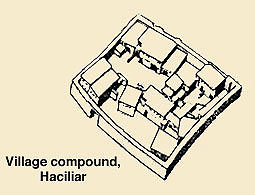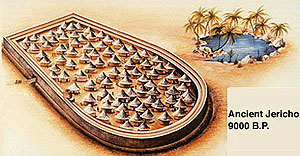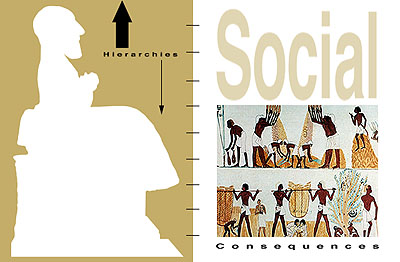Questions to consider:
- Why do agricultural societies typically tend require more social discipline and allow less individual freedom than hunter-gatherer communities?
- Why do social hierarchies and elites tend to develop in settled agricultural communities?
- What are the advantages of developing elites and class divisions? What are the disadvantages?
- What is the relationship between civilization and war?
 The illustration left of an early agricultural village compound in Turkey and perhaps the world's oldest town site at Jericho pictured below depict one of the paradoxes of the new way of life. Settled agricultural villages meant the accumulation of storable food-stuffs and other wealth. These food surpluses and other capital represented the prerequisite conditions for further cultural advance--for civilization.
The illustration left of an early agricultural village compound in Turkey and perhaps the world's oldest town site at Jericho pictured below depict one of the paradoxes of the new way of life. Settled agricultural villages meant the accumulation of storable food-stuffs and other wealth. These food surpluses and other capital represented the prerequisite conditions for further cultural advance--for civilization.
 But what can be stored can also be stolen. Hence, we should expect to find, where ever these surpluses occur, large investments of labor in building walls or other measures to protect that vulnerable wealth. Thus, the creation of wealth paradoxically meant the creation of "security problems" as well. In some instances, at least, as wealth increased in societies, insecurity and social unrest increased with it.
But what can be stored can also be stolen. Hence, we should expect to find, where ever these surpluses occur, large investments of labor in building walls or other measures to protect that vulnerable wealth. Thus, the creation of wealth paradoxically meant the creation of "security problems" as well. In some instances, at least, as wealth increased in societies, insecurity and social unrest increased with it.
The construction of walls on a large scale occurred for the first time in history at ancient Jericho, where the stone tower located just below the gate is approximately 30 feet tall and 30 feet broad at the base. This town, the earliest settlement of moderate size yet discovered, is 9,000 years old. A stone structure the size of Jericho's earliest wall obviously represents a huge organized effort for the size of the population involved. Such projects imply surpluses of food to feed workers who are not engaged directly in food production. Building such large walls and towers also requires extensive cooperation or coordination within the community. In fact, the level of cooperation necessary to create walls on this scale implies organization with a directing, managing function--in short, a government.
Organizing communities in this way meant an enormous expansion of what human beings could accomplish together. At the same time, the ancient practical egalitarianism of hunter-gatherer societies was challenged by the circumstances of the new mode of life. In addition to the new threats to security, the new life in towns and cities required a new mode of social organization--a division between those who direct and manage and those who are directed. As specializations emerged in the economy, inequalities of wealth and status emerged with them. In short, hierarchies of wealth, status and power began to characterize the new societies.


 The illustration left of an early agricultural village compound in Turkey and perhaps the world's oldest town site at Jericho pictured below depict one of the paradoxes of the new way of life. Settled agricultural villages meant the accumulation of storable food-stuffs and other wealth. These food surpluses and other capital represented the prerequisite conditions for further cultural advance--for civilization.
The illustration left of an early agricultural village compound in Turkey and perhaps the world's oldest town site at Jericho pictured below depict one of the paradoxes of the new way of life. Settled agricultural villages meant the accumulation of storable food-stuffs and other wealth. These food surpluses and other capital represented the prerequisite conditions for further cultural advance--for civilization. But what can be stored can also be stolen. Hence, we should expect to find, where ever these surpluses occur, large investments of labor in building walls or other measures to protect that vulnerable wealth. Thus, the creation of wealth paradoxically meant the creation of "security problems" as well. In some instances, at least, as wealth increased in societies, insecurity and social unrest increased with it.
But what can be stored can also be stolen. Hence, we should expect to find, where ever these surpluses occur, large investments of labor in building walls or other measures to protect that vulnerable wealth. Thus, the creation of wealth paradoxically meant the creation of "security problems" as well. In some instances, at least, as wealth increased in societies, insecurity and social unrest increased with it.